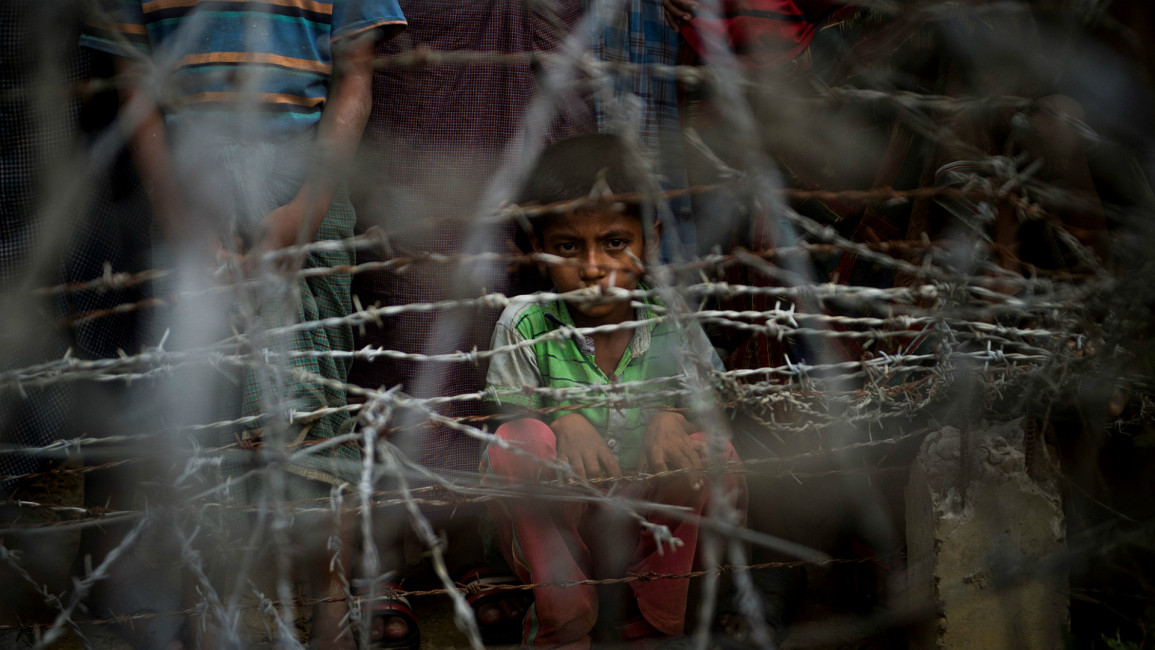Myanmar meets to establish 'independent probe' into Rohingya massacres
The meeting is the third of its kind since Aung San Suu Kyi's government took power in 2016 and follows a deal allowing the UN to enter the Rakhine state to undergo an assessment on when the refugees are able to return.
Some 700,000 Rohingya Muslims have fled over the border to Bangladesh since August to escape a bloody military crackdown that has left a trail of torched villages in its wake as refugees allege murder and rape by Myanmar's armed forces.
Suu Kyi and Commander-in-Chief Min Aung Hlaing were among the 15 attendees at Friday's meeting in Naypyidaw, a Facebook post by the office of President Win Myint said.
It covered "national security and international relations including the crisis in Rakhine state" and the formation of an "investigative commission" on Rakhine.
The country has said it will establish its own independent probe to investigate human rights abuses.
Myanmar's security forces have been accused of rape, killing, torture and the burning of Rohingya homes. The United Nations and the United States have described the army crackdown as "ethnic cleansing".
The government has denied the accusations, instead blaming the violence on Rohingya insurgents who attacked security posts that triggered the reprisals and the latest exodus of the population that has long been denied citizenship and other basic rights.
The government of predominantly-Buddhist Myanmar says Rohingya are illegal migrants from Bangladesh, even though some have lived in the country for generations.
Scenes of dispossessed Rohingya fleeing en-masse as their villages in Rakhine State burn behind them have provoked outrage around the world.
Myanmar's authorities have continued to deny the growing documentation.
In September, the Rakhine state border security minister rejected the reports saying: "Where is the proof? Look at those women who are making these claims - would anyone want to rape them?"
An internal investigation conducted by the military was released late last year, clearing themselves over the reported Rohingya atrocities, and was described as 'white-washing' by human rights groups.
In the past, Suu Kyi has defended the military operation, and authorities claim the security crackdown was in response to attacks by Rohingya militants on police posts.
Yanghee Lee, a UN special envoy on human rights described Myanmar's violent military operations as bearing, "the hallmarks of a genocide".
Pressure is also mounting from the International Criminal Court (ICC), which is due to discuss on June 20 whether to launch an investigation into the crackdown.
Myanmar, which denies the ethnic cleansing allegations, has dismissed the move, saying it is not a signatory or member of the Rome Statute which underpins the ICC.
Blame game
Myanmar has dragged its feet for months over the repatriation of the Muslim minority, insisting the region is safe for their return but refusing access to outsiders to evaluate conditions.
Myanmar and Bangladesh agreed in November to begin repatriating the Rohingya, but the refugees expressed concern that they would be forced to return and would face unsafe conditions in Myanmar if the process is not monitored by international aid groups.
The UN and other rights groups have warned that a mass repatriation of Rohingya would be premature, as Myanmar has yet to address the systematic legal discrimination and persecution the minority has faced for decades.
Despite Bangladesh and Myanmar vowing to begin repatriation in January, the plan has been repeatedly delayed as both sides blame the other for a lack of preparation. More than 8,000 refugees are waiting for repatriations according to a list compiled by Bangladesh.
Both countries have traded accusations over who is responsible for the delay. Bangladesh accuses Myanmar of trying to buy time by pretending to cooperate over repatriation for the benefit of the international community.


